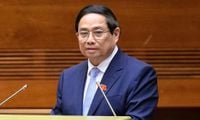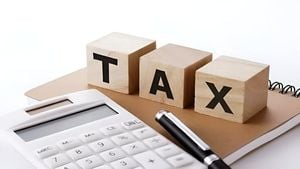On May 5, 2025, Prime Minister Pham Minh Chinh presented a detailed report on Vietnam's socio-economic situation during the opening session of the 9th National Assembly. The report highlighted significant achievements in the economic sector, as well as the challenges posed by external factors, particularly the recent high reciprocal tax policy announced by the United States.
According to the Prime Minister, the global landscape has become increasingly complex, with the U.S. imposing high tariffs that have adversely affected global economic growth. This policy threatens the supply chains and international trade flows that are vital for countries like Vietnam. "The U.S. announced a high reciprocal tax policy, then postponed it for 90 days with trade partners (excluding China) and set a temporary tax rate of 10%. This has negatively impacted global economic growth," he stated.
In light of these developments, Vietnam has taken proactive measures to respond effectively. The Prime Minister noted, "Vietnam has begun negotiations with the U.S., with the first session expected to take place on May 7, 2025." A technical delegation from Vietnam visited the U.S. on May 1 to discuss bilateral trade negotiations with relevant agencies.
Despite the global economic challenges, the report revealed that Vietnam's GDP growth in the first quarter of 2025 is estimated to reach 6.93%, marking the highest growth rate compared to the same period in the previous five years. Several localities recorded double-digit growth during the first four months of the year, indicating a resilient economic performance.
The Consumer Price Index (CPI) also saw an increase of 3.22%, suggesting that inflation is being kept under control while still allowing for flexible and effective macroeconomic policy management. The Prime Minister emphasized that the government's focus on stability and growth has yielded positive results, with many sectors showing signs of recovery.
However, the Prime Minister did not shy away from addressing the challenges that remain. He pointed out that while Vietnam's exports to the U.S. reached $31.4 billion—up 22% from the previous year—imports also rose to $4.1 billion, a 21% increase. This imbalance, exacerbated by the U.S. tax policy, has placed pressure on certain export sectors like textiles and wood products.
"The impact of the U.S. tariff policy has adversely affected several export sectors, while domestic purchasing power is recovering slowly," he said. The Prime Minister acknowledged that bureaucratic hurdles continue to pose challenges for businesses and individuals alike, contributing to a climate of uncertainty in the market.
In response to these economic pressures, the government is preparing to implement several strategic measures. A decree on controlling strategic trade will soon be issued, alongside increased monitoring of product origins and efforts to expand markets and supply chains. These initiatives aim to enhance the quality and competitiveness of Vietnamese goods and services.
The government is also focused on supporting businesses and workers affected by the U.S. tariff policies. This includes developing solutions to address difficulties faced by sectors most impacted by the trade tensions.
Looking ahead, the government has set ambitious goals for economic growth. Vietnam aims for GDP growth of 8% or more, with a projected economic scale exceeding $500 billion, which would elevate the country to the 30th position in global rankings. The average GDP per capita is expected to surpass $5,000 by 2025.
To achieve these goals amid numerous challenges, the Prime Minister urged all levels of government and relevant sectors to implement effective and coordinated solutions. The government plans to increase state budget revenue by over 15% and adjust the budget deficit to 4-4.5% of GDP when necessary, while also tightening expenditures to boost development investments.
In 2024, Vietnam's economy had shown remarkable resilience, with a GDP growth rate of 7.09%, the highest in the region. This growth propelled Vietnam's economy to a scale of $476.3 billion, moving it up three places to rank 32nd in the world. The Prime Minister expressed pride in these achievements, especially in maintaining stability amidst global uncertainties.
However, challenges remain. The rate of disbursement for public investment continues to lag behind expectations, and the issue of non-performing loans in the banking sector persists. The Prime Minister acknowledged the need for ongoing efforts to address these issues, stating, "The pressure to manage the macroeconomic situation remains significant, particularly concerning interest rates and inflation control."
As Vietnam navigates these complex challenges, the government is poised to adapt its strategies to foster economic growth and stability. The upcoming negotiations with the U.S. represent a critical opportunity for Vietnam to safeguard its interests and promote sustainable trade practices.
In summary, while Vietnam faces external pressures from U.S. trade policies, the government's proactive approach and commitment to reform are essential in steering the economy towards its ambitious growth targets. The upcoming negotiation session on May 7 will be a significant step in addressing these challenges and fostering a more balanced trade relationship with the United States.




